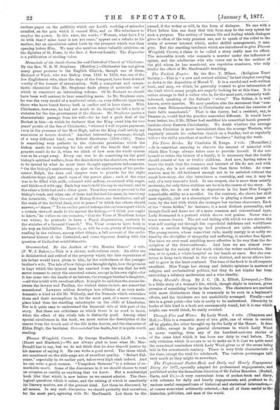Memorials of the South-Saxon See and Cathedral Church of Chichester.
By the Rev. W. R. W. Stephens. (Bentley.)—Chichester has not given many great prelates to the English Church, though one of them, Richard of Wych, who was bishop from 1245 to 1253, was one of the few Englishmen who, since the days of the Conquest, have been deemed worthy of the honour of canonisation. Still a competent and sympa- thetic chronicler like Mr. Stephens finds plenty of materials out of which to construct an interesting volume. Of St. Richard we should have been well content to hear something more. As Mr. Stephens says, he was the very model of a mediteval saint,—a very different type from those who have found favour both in earlier and in later times. With Chichester, however, he had not much to do, though be left a body of statutes for the due government of the diocese. Mr. Stephens quotes a characteristic passage from his will—for he had a good deal of the Becket in him—in which he declares that the King owed him for two years' profits of the See of Chichester, "whereof I will require payment, even in the presence of the Most High, unless the King shall satisfy my executors as heroin desired." Another interesting personage, though of a very different kind, was Robert Sherburne (1508-1536). There is something very pathetic in the elaborate provisions which the bishop made for ensuring for his soul all the benefit that regular prayers could do for it, when we think of how soon the whole system was to be swept away. Every one was to do something for the good bishop's spiritual welfare, from the dean down to the choristers, who were to be moved by what he must have thought appropriate inducements. "On the bishop's anniversary, as also on the anniversary of his prede- cessor, Ralph, the dean and chapter were to provide for the eight chorister-boys eight small cups of the purest glass ; each of the cups was to be filled with milk, coloured with saffron, sweetened with sugar, and thickened with egg. Each boy was to hold his cup in one hand, and in the other a little loaf and a silver spoon. Then they were to proceed to the bishop's tomb, and when one of them had finished his mess, he was to say the invariable, 'May the soul of Bishop Robert, our benefactor, and all the souls of the faithful dead, rest in peace !' to which the others should answer,—' Amen.'" To an earlier period belongs the curious report which a certain steward made to his master the bishop,—" I think you ought to know," he writes on one occasion, "that the Vicar of Mendham keeps two wives ; he pretends to have a Papal dispensation, contrary to the statutes of a General Council." The Vicar seems to have been in his way an Infallibilist. There is, as will be seen, plenty of interesting reading in the volume, among other things, a full account of the archi- tectural history of the Cathedral, and some vigorous dealing with the question of Cathedral establishments.









































 Previous page
Previous page